I think that the verdict was incorrect, but I cannot imagine anything that I would have wanted to happen differently. [The defendant] spent lavishly on a “dream-team” defense, which was his right. He was tried before a panel of jurors who were not medical or scientific experts, which is what “a jury of his peers” means. And his prosecutors were required to prove their case beyond a reasonable doubt, which is the cornerstone of the American system of justice. We have made a conscious decision in America that we would rather allow ten guilty men to go free than risk putting one innocent man in jail. This means that, sometimes, people who should be in jail will be found innocent. This does not mean that the system is broken; it means that the system is working exactly as it was designed.
I wrote the above words almost 20 years ago, on October 4, 1995—the day after OJ Simpson was found not guilty of killing Nicole Brown Simpson and Ronald Goldman. At the time, I was living in Santa Barbara, CA, completing my Ph.D. I followed the trial as closely as one could follow things without a TV or an Internet connection, and I wrote this in a "writer's journal" thinking that I would follow up in an article or something.
So here is the article or something—eighteen years in the making, but hopefully no worse for the wear.
There are many differences between George Zimmerman and OJ Simpson, but there are a few similarities as well—mainly that both of them were defendants in high-profile criminal trials that became enmeshed in America’s excruciatingly complicated narratives about race. They both carried far more significance than most of the thousands of murder trials in the country every year that are not metaphors for deep social problems. And, on a very personal level, I believe that both men were morally culpable for taking a human life.
Another important similarity, however is that I was not on either jury. I did not hear everything that they heard—and perhaps more importantly, I was not shielded from everything that they were shielded from. I have served on a jury, though, and I know that it is very easy for people who have not experienced what the jury has experienced to criticize and second-guess the verdict.
I also know that most jurors are extremely conscientious about their assignment. They weigh the evidence carefully, and they take the judge’s instructions very seriously. They are not experts on anything related to the case. They are not supposed to be. It is an imperfect system, but it is probably less imperfect than any of the alternatives.
The same is true of a judicial system that stacks the deck—rather substantially as it turns out—in favor of the defendant. This is not an accident. Fully half of the amendments in the Bill of Rights (4,5,6,7,and 8) are devoted to ensuring due process protection in criminal and civil trials. The state has to meet a very high burden of proof before depriving somebody of life or liberty--this is supposed to ensure that the courts do not become instruments of tyranny. It is supposed to be hard to convict people of stuff.
What this means is that, very often, criminal trials will not turn out like I want them to. It also means that the pursuit of justice for an individual may very well work against my sense of collective justice in the society. And yes, there still is racism, and sometimes it affects trials and juries. In the present case, though, I do not think it is necessary to invoke a racial motive to understand the verdict--it can be understood perfectly well as the combination of an appropriately high burden of proof for the prosecutors combined with a very permissive legal environment for those carrying concealed weapons.
I wish things had been different. I wish that George Zimmerman had not been carrying a gun during the encounter. I wish that the gun laws had been less permissive--that they had been designed to increase the responsibilities of people carrying weapons to the same extent that they increased access to conceal-carry permits. I wish that the legislature had given more thought to the consequences of the "stand-your-ground" law before putting it into effect.
But juries do not decide the appropriateness of laws; nor is it fair to expect them to consider the zeitgeist. They are supposed to rule on a very specific set of facts within equally specific instructions given by a judge--and to do so in a legal environment that has been intentionally designed to hold prosecutors to a very high standard of proof. The Zimmerman jury made a reasonable decision based on the laws in effect and the facts in evidence. I wish that many things had been otherwise, but. . . .
We have made a conscious decision in America that we would rather allow ten guilty men to go free than risk putting one innocent man in jail. This means that, some times, people who should be in jail will be found innocent. This does not mean that the system is broken; it means that the system is working as designed.
